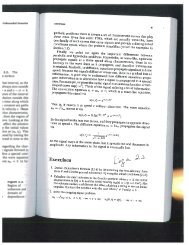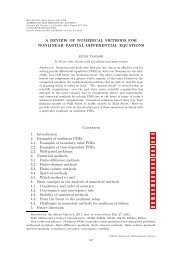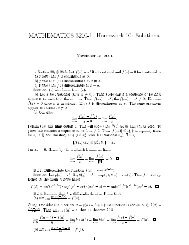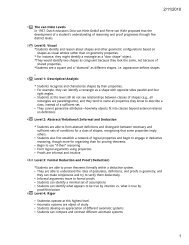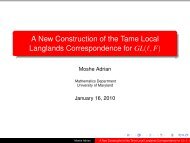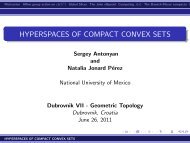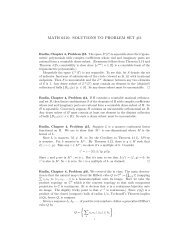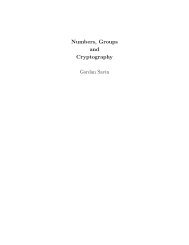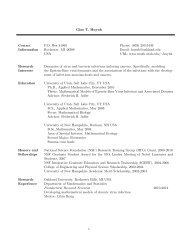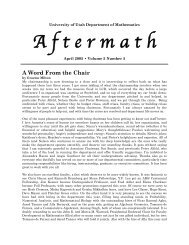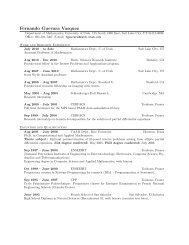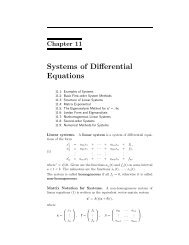Engineering Calculus II - Math 1320 Spring 2012 - Department of ...
Engineering Calculus II - Math 1320 Spring 2012 - Department of ...
Engineering Calculus II - Math 1320 Spring 2012 - Department of ...
You also want an ePaper? Increase the reach of your titles
YUMPU automatically turns print PDFs into web optimized ePapers that Google loves.
<strong>Engineering</strong> <strong>Calculus</strong> <strong>II</strong> - <strong>Math</strong> <strong>1320</strong><br />
<strong>Spring</strong> <strong>2012</strong> - Sect 7 (8/9)<br />
Lectures: MTWF 10:45am-11:35am - LCB 225<br />
Labotary: H 9:40am-10:30am - WBB 206 - Section 8<br />
H 10:45am-11:35am - WBB 206 - Section 9<br />
Instructor: Christel Hohenegger<br />
Office: LCB 333<br />
Phone: (801) 585-1637<br />
E-mail: choheneg@math.utah.edu<br />
Webpage: http://www.math.utah.edu/~choheneg<br />
TA: Michael Shrieve - LCB L<strong>of</strong>t<br />
Course webpage: CANVAS on CIS (http://cis.utah.edu)<br />
Office Hours: TBD or by appointment<br />
Textbook: <strong>Calculus</strong>: Concepts and Contexts, by James Stewart, 4th edition; BROOKS/<br />
COLE CENGAGE Learning, 2010; ISBN-13 0-495-55742-0; ISBN-10 0-495-55742-0;<br />
price about $195.<br />
The textbook comes with an accompanying website with homework hints.<br />
http://www.stewartcalculus.com/media/9_home.php<br />
Updates: Topics covered and assignments are listed at the end <strong>of</strong> the syllabus. However,<br />
the weekly schedule is subject to change during the semester depending on the paste<br />
<strong>of</strong> the lectures. Updated topics and assignments will be posted on CANVAS. You are<br />
responsible for checking it regularly.<br />
http://utah.instructure.com/courses/221934<br />
<strong>Math</strong>ematics Tutoring Center: Free tutorial is available in room 155 <strong>of</strong> the T. Benny<br />
Rushing <strong>Math</strong>ematics Center (adjacent to the LCB and JWB). Hours are 8am-8pm<br />
Monday-Thursday and 8am-6pm on Friday. For more information consult the website.<br />
http://www.math.utah.edu/ugrad/mathcenter.html<br />
You might find the videos and problems from the website <strong>of</strong> the Khan Academy helpful.<br />
https://www.khanacademy.org/<br />
Prerequisites: ”C” or better in MATH 1310, or AP Calc BC score <strong>of</strong> 3 or better, or<br />
<strong>Department</strong>al Consent.<br />
1
Description: The course will cover essential <strong>of</strong> knowledge <strong>of</strong> <strong>Calculus</strong> used for engineering<br />
applications. The course is structured into four lecture hours per week, and<br />
one lab hour per week. The lecture class will incorporate instructor lectures, including<br />
content on the applications <strong>of</strong> calculus to <strong>Engineering</strong>, weekly short quizzes and random<br />
pop quizzes. Lab sections will comprise group problem solving sessions led by the<br />
teaching assistant, weekly homework discussion and students participation. Topics cover<br />
include integral expressions for moments and work; modeling with first order differential<br />
equations; infinite series and sequences; power series and Taylor series; vectors, dot and<br />
cross products, and the geometry <strong>of</strong> space; the calculus <strong>of</strong> vector functions and particle<br />
motion in space; differential calculus for functions <strong>of</strong> several variables, including partial<br />
and directional derivatives, and multi-variable optimization (Chapters 6-11).<br />
The work you will complete in <strong>Math</strong> <strong>1320</strong> comprises weekly homework and quizzes, three<br />
super quizzes, two midterm exams, and a comprehensive final exam. Homework will be<br />
turned in and quizzes will be given every Friday except during exam days and holidays.<br />
Reading: You are expected to have read the corresponding section prior to each class.<br />
We will cover about three sections per week. Even if you spend as little as ten minutes<br />
on this, it will make the discussion in class much clearer, and overall you will save time.<br />
Attendance to the lab is mandatory and will be recorded. You should attend all the<br />
lectures, however attendance will not be checked in lectures. Remember that homework,<br />
quizzes, super quizzes and exams happen during lectures on Fridays.<br />
Lab: Every Thursday a teaching assistant-directed lab section will be held. These lab<br />
sections will have smaller class sizes allowing the TA to more closely monitor student<br />
learning. The Thursday directed group work will help the students prepare for the<br />
homework, quizzes, and exams given the subsequent Friday. Credit will be given for<br />
lab attendance and student presentations. Additionally, you will have until Tuesday<br />
following the lab session to turn in your completed lab worksheet for credit. These lab<br />
sections will be a helpful and supportive environment where everyone should feel able<br />
to present some <strong>of</strong> the time. Please attend the lab session you registered for.<br />
Extra Lab: The extra lab time is designed to provide an extra hour to work problems<br />
with the TA. After the first quiz, you will get the opportunity to sign up for this extra<br />
lab hour. An announcement will be send on CANVAS on the sign-up and scheduling<br />
process. The extra lab hour is voluntary, but once you elect to attend it, it will count<br />
toward your attendance points and it becomes mandatory.<br />
Quizzes: At the end <strong>of</strong> every Friday class (except when an exam or super quiz is<br />
scheduled), a short 1-2 problem quiz will be given, taking roughly 10 minutes. The quiz<br />
will cover relevant topics covered in the week’s lectures and in the lab section. The two<br />
lowest score will be dropped. No make-up quiz will be given.<br />
2
Super Quizzes: Two weeks prior to each exam, a more extensive quiz will be given on<br />
select Fridays, consisting <strong>of</strong> 3-5 problems and taking roughly 30 minutes to complete.<br />
The super quiz will cover material from the preceding weeks. None <strong>of</strong> the super quizzes<br />
can be dropped. Check with the up-to-date CANVAS schedule for the dates <strong>of</strong> the super<br />
quizzes. The tentative dates are February 1, March 8, April 19.<br />
Homework: Assigned problems are listed at the end <strong>of</strong> the syllabus and on CANVAS.<br />
Only the highlighted problems will be collected and graded (2 per section). Homework<br />
will be collected in lecture every Friday (except when there is an exam, when homework<br />
will be collected on the following Tuesday), from sections covered up to Wednesday <strong>of</strong><br />
the same week. No late homework will be accepted. The lowest three homework scores<br />
will be dropped. If you click on a homework assignment on CANVAS, you will see listings<br />
<strong>of</strong> suggested and collected problems. Homework will be collected on paper only.<br />
You are encouraged to solve all the assigned problems as they are part <strong>of</strong> the quiz and<br />
exam material. To succeed in this class, you’ll need to invest time in solving problems<br />
from very simple problems letting you practice just one specific technique to quite sophisticated<br />
questions. Feel free to do as many problems as necessary and to ask us<br />
for help. Solutions to odd problems are provided at the end <strong>of</strong> the textbook. Keep in<br />
mind that it is more useful to do a few involved exercises carefully and thoroughly than<br />
rushing through a large number <strong>of</strong> simple problems.<br />
Midterm exams: There will be TWO in-class exams (55 minutes). No books, notes,<br />
formula sheets, calculators (scientific or not), computers, phones (smart or not) or electronic<br />
device will be allowed. The tentative dates are: February 15, March 29.<br />
Always consult CANVAS to confirm those dates. None <strong>of</strong> the exams can be dropped.<br />
You can replace the score <strong>of</strong> your lowest exam by the score <strong>of</strong> the final exam (if better).<br />
Review and practice: A practice exam will be posted about a week prior to each<br />
midterm. Practice exams will be similar in structure and format to the real exam and<br />
will be discussed in the lab session prior to the exam. Additionally, we will review<br />
important concepts in class on Wednesday before each exam.<br />
Final Exam: The final exam covers all the material presented during the semester. It<br />
will be held on Friday April 26, 10:30am-12:30pm.<br />
Review: We will have a review session before the final (TBD).<br />
Make-up and regrading: Any conflict leading to missed exams or super quizzes are<br />
your responsibility and must be arranged ahead <strong>of</strong> time or within a week past the test.<br />
Failure to do so may result in a zero for the corresponding test. Regrading inquiries<br />
must be submitted in writing within a week <strong>of</strong> the test being returned.<br />
Students with Disabilities: The University <strong>of</strong> Utah seeks to provide equal access<br />
to its programs, services and activities for people with disabilities. If you will need<br />
accommodations in the class, reasonable prior notice needs to be given to the Center for<br />
3
Disability Services, 162 Olpin Union Building, 581-5020. CDS will work with you and<br />
us to make arrangements for accommodations.<br />
Grading: Grades are determined as a weighted average as follows<br />
Lab Worksheets Quizzes Super Quizzes Homework Exams Final<br />
5% 5% 7.5% 7.5% 15% 40% 25%<br />
Letter grades are determined as follows<br />
A A- B+ B B- C+ C C- D+<br />
100-93 92-90 89-87 86-83 82-80 79-77 76-73 72-70 69-67<br />
D D- E<br />
66-63 62-60 59-0<br />
I reserve the right to modify these in special cases and to decide if a curve is needed.<br />
Honor Code: You are expected to abide by the University <strong>of</strong> Utah Honor Code and to<br />
avoid any instances <strong>of</strong> academic misconduct, including but not limited to: (1) possessing,<br />
using, or exchanging improperly acquired written or oral information during an exam,<br />
(2) substitution <strong>of</strong> material that is wholly or substantially identical to that created or<br />
published by another individual(s), and (3) false claims <strong>of</strong> performance or work.<br />
A few more thoughts:<br />
Attend class and lab. Plan to do homework daily. Being engaged helps you learn.<br />
Missing quizzes and homework will affect your grade. Know when the super quizzes and<br />
exams are. Know how grades are computed before its too late.<br />
Form study groups with other students. Working in groups helps students self-evaluate<br />
what they know and what they do not know better than students working by themselves.<br />
Cramming does not work. Instead study steadily during the semester. Focus on understanding<br />
the material rather than memorizing recipes.<br />
Before you start any calculations, think about what kind <strong>of</strong> answer you expect: area is<br />
a positive number, etc.<br />
On an exam, read all the problems before you start working on any <strong>of</strong> them. Check your<br />
answers and make sure they are correct and well presented.<br />
I want you to be successful, not only in this class, but in your entire undergraduate<br />
career and I am here to help you achieve this goal. Do not be shy to ask questions<br />
during and after lectures, to come by my <strong>of</strong>fice during <strong>of</strong>fice hours or to email me with<br />
any concerns.<br />
Have a great semester !<br />
4
Week-by-week guide<br />
Week 1: 6.2-6.4—Volumes, shells, cylinders, arc length<br />
HW 1: 6.2: 1, 2, 3, 4, 5, 6, 9, 10, 14, 17, 31, 32, 33, 35, 46—4, 46 graded<br />
6.3: 3,4, 9, 10, 13, 14, 29, 30—14, 30 graded<br />
Quiz 1: 6.2-6.3<br />
Week 2: 6.5-6.6—Average Values, Applications <strong>of</strong> Integration to <strong>Engineering</strong>;<br />
7.1–Modeling with Differential Equations<br />
HW 2: 6.4: 7, 8, 9, 20—8, 20 graded<br />
6.5: 1-3, 7-8, 12 – 2, 8 graded<br />
6.6: 1-2, 5-6, 8, 29-30, 42-44, 49-50 – 2, 44 graded<br />
Quiz 2: 6.4-6.6<br />
Week 3: 7.2-7.4—Direction Fields, Differential Equations, Exponential Growth and Decay<br />
HW 3: 7.1: 1-5, 7, 9, 10, 12 – 3, 10 graded<br />
7.2: 3-6, 9-14, 21, 22 – 14, 22 graded<br />
7.3: 1-6, 11-14, 19-22, 43-48 – 14, 46 graded<br />
Quiz 3: 7.1-7.3<br />
Week 4: 8.1-8.3—Sequences, Series, Convergence Tests for Series<br />
HW 4: 7.4: 3, 4, 7-11, 13-16, 18,19 – 10, 14 graded<br />
8.1: 2-6, 8, 11-14, 27-28, 31, 43-44, 47-48—28, 48 graded<br />
8.2: 9, 11-12, 15-16, 19-20, 23-24, 36, 44 —16, 24, 44 graded<br />
Super Quiz 4: 6.2-6.6, 7.1-7.4, 8.1-8.2<br />
Week 5: 8.4-8.6— Sums, Power Series, Representing Functions with Power Series<br />
HW 5: 8.3: 3-4, 6-7, 9-10, 25-28—10, 28 graded<br />
8.4: 1, 3-10, 13, 21-34, 35-36, 38-39 – 24, 32 graded<br />
8.5: 1-2, 3-24 – 4, 18 graded<br />
Quiz 5: 8.3-8.5<br />
Week 6: 8.7-8.8 Taylor and Maclaurin Series, Applications <strong>of</strong> Taylor Polynomials, Review.<br />
HW 6: 8.6: 3-10, 11-12, 13-18, 23-26, 32, 38 – 18, 24 graded<br />
8.7: 5-8, 11-16, 21-28, 39, 40, 47-52, 59-62 – 16, 24 graded<br />
8.8: 11-14, 23-24, 27-28 – 16, 28 graded<br />
Midterm 1: Week 1 to 5.<br />
5
Week 7: 9.1-9.3 Three Dimensional Coordinates, Vectors, Dot Product<br />
HW 7: 9.1: 3-4, 9-10, 38 —10, 38 graded<br />
9.2: 5-8, 15-16, 22, 30 —8, 22, 30 graded<br />
Quiz 7: 9.1-9.2<br />
Week 8: 9.4-9.5 Cross Product, Equations <strong>of</strong> Lines and Planes<br />
HW 8: 9.3: 1-4, 11-12, 15-16, 21-22 —16, 22 graded<br />
9.4: 1, 2-3, 4, 7-13, 19-20, 21-22, 23-24, 27-28, 31, 39 – 10, 24 graded<br />
Quiz 8: 9.3-9.4<br />
Week 9: 9.6-10.1 Functions and Surfaces, Vector Functions, Space Curves<br />
HW 9: 9.5: 1, 2-5, 6-10, 11-12, 15-16, 17-20, 21-32, 37, 39-42, 45, 55-56 – 8, 28 graded<br />
9.6: 9-13, 16-24, 32-34 – 18, 24 graded<br />
9.7: 3-10, 15-18, 21-24 – 18, 22 graded<br />
Super Quiz 9: 9.1-9.7<br />
Week 10: 10.2-10.4 Derivatives and Integrals <strong>of</strong> Vector Functions, Arc Length, Curvature<br />
HW 10: 10.1: 1-4, 5-8, 15-18, 36-40 – 8, 36 graded<br />
10.2: 1-2, 5-6, 13-14, 17-18, 19-20, 33-34, 51-52 —14, 20, 52 graded<br />
10.3: 1-2, 15-18, 21-22, 30 —16, 18 graded<br />
Quiz 10: 10.1-10.3<br />
Week 11: 10.4,10.5 Velocity, Acceleration, Parametric Surfaces, Review.<br />
Hw 11: 10.4: 3-8, 9-12, 13-14, 21-22, 33-36 – 10, 34 graded<br />
10.5: 1-2, 3-6, 19-26 – 2, 24 graded<br />
Midterm 2: Week 6-10.<br />
Week 12: 11.1-11.3 Functions <strong>of</strong> Several Variables, Limits, Partial Derivatives<br />
HW 12: 11.1: 9-18, 19-22, 35-40, 41-44 – 10, 18 graded<br />
11.2: 5-16, 27-30, 33-36 – 14, 28 graded<br />
Quiz 12: 11.1-11.2<br />
Week 13: 11.4-11.5 Tangent Planes, Linear Approximation, Chain Rule<br />
HW 13: 11.3: 3-4, 10, 15-32, 45-46, 57-58, 69-72 – 32, 72 (a,c only) graded<br />
11.4: 3-4, 17-18, 22, 29-32—4,22, 32 graded<br />
Quiz 13: 11.3-11.4<br />
6
Week 14: 11.6-11.7 Directional Derivative, Gradient Vector, Maximum and Minimum Values<br />
HW 14: 11.5: 1-4, 7-8. 13-14, 34 — 8, 34 graded<br />
11.6: 1-2, 4-6, 7-10, 11-17, 21-24, 28-32, 39-44, 47-48 – 24, 40 graded<br />
Super Quiz 14: 11.1-11.6<br />
Week 15: 11.8 Lagrange Multipliers, Review<br />
HW 15: 11.7: 1, 3-4, 5-16, 17, 27-32, 35-36, 39-40, 43, 44 – 10, 30 graded<br />
11.8: 3-14, 25-26 – 10, 16 graded<br />
Final Exam: Friday April 26: Comprehensive.<br />
7




